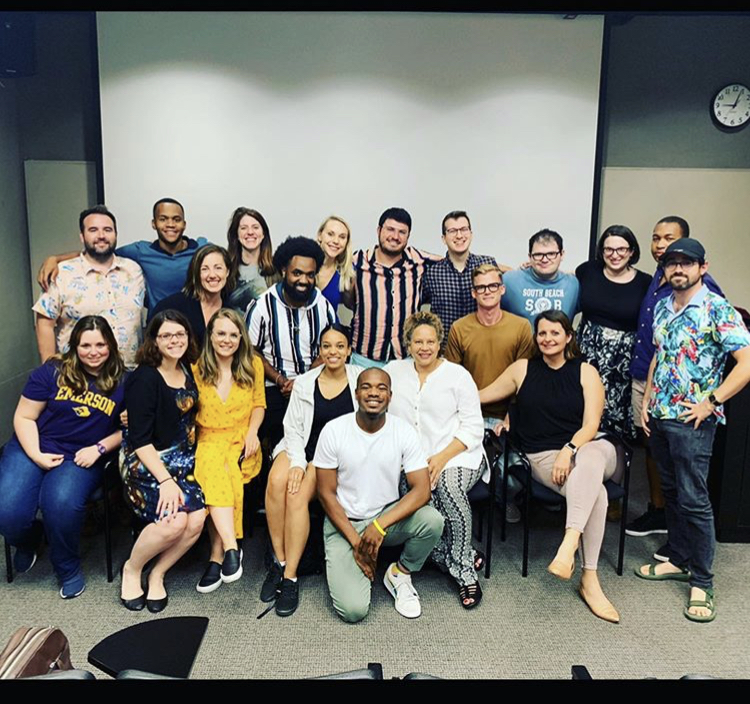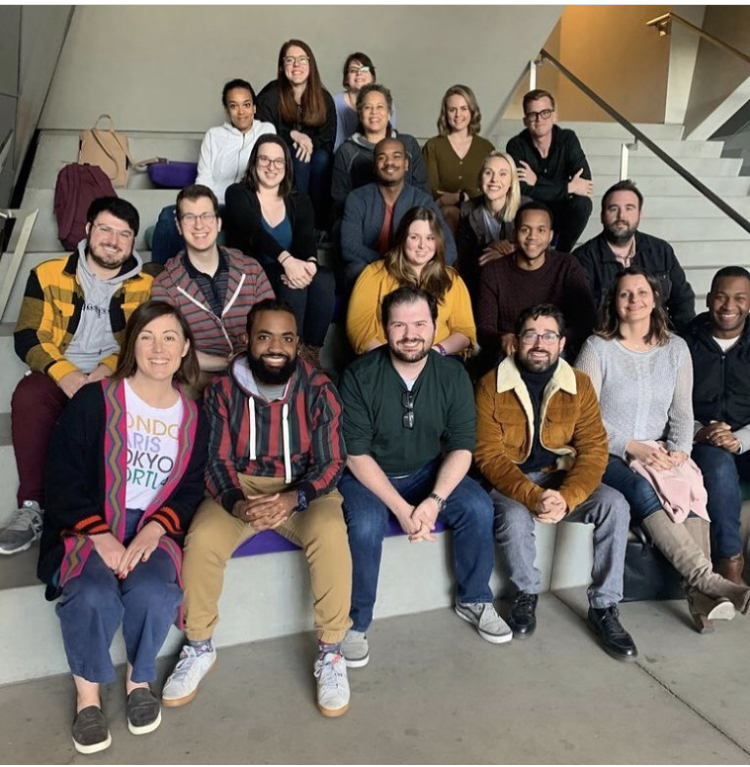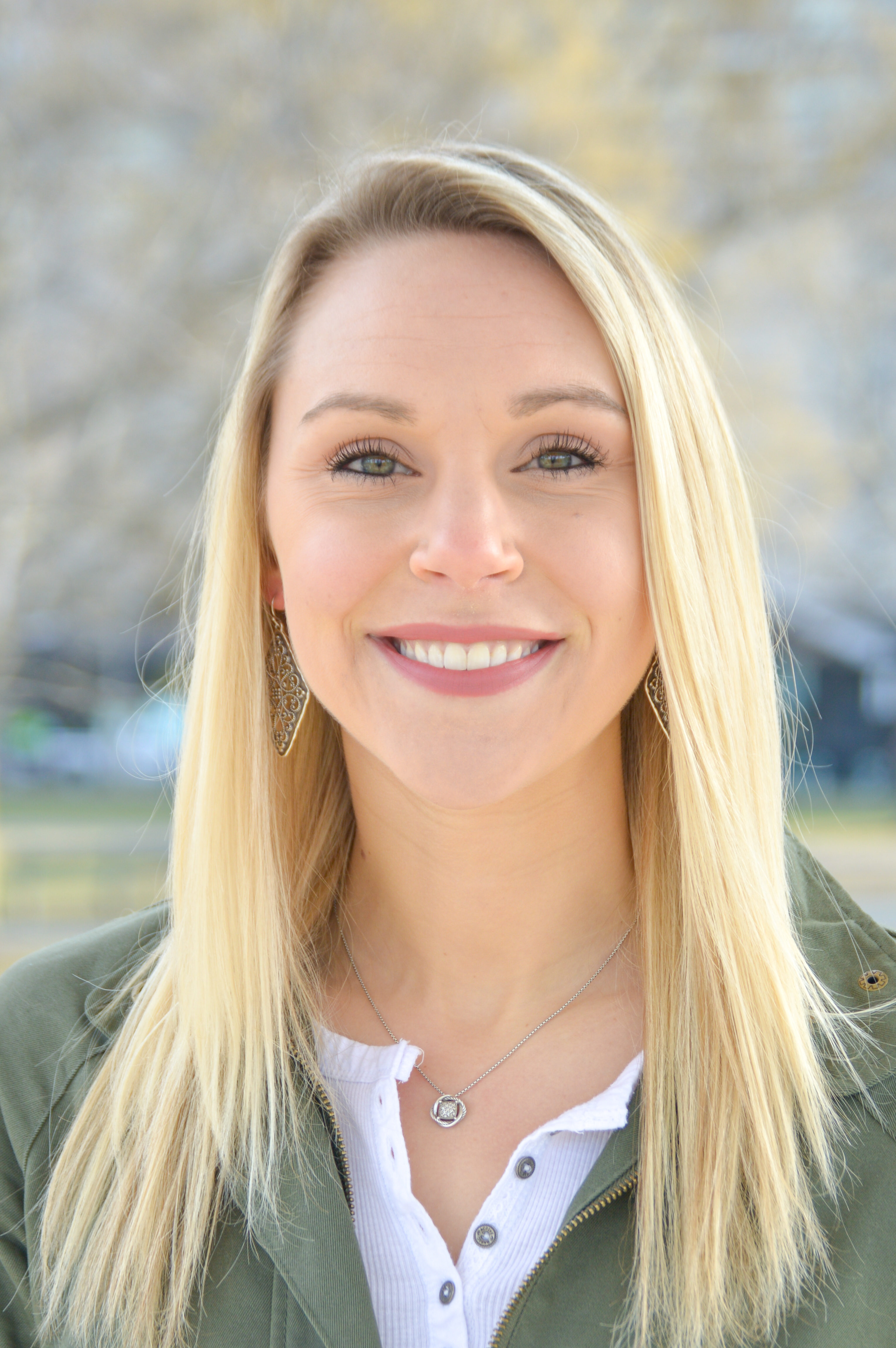
From her first day of grad school to her very last assignment, ’20 Writing for Film and Television MFA graduate and Assistant Director of Graduate Admissions, Haley Bresnahan, has successfully completed Emerson’s rigorous low-residency program. She’s given us the inside scoop on her journey from start to finish. Keep reading for an exclusive Q&A about her experience, cohort, and proudest moments as a writer during her time as a Writing for Film and Television MFA student.

Q: If you could describe the MFA in Film & Television program in three words, what would they be and why?
A: “Collaborative, rigorous, humbling (in a good way!)
Collaborative: When I started the program, I was so anxious that I would find myself in an environment where people were competitive with one another when it came to showcasing their skills as writers; entertainment is a competitive industry, after all. I was happy to find that my peers all came in with the intention of growing as writers for themselves and not for show. We all seemed to have a mutual understanding that we were in this together and there to build each other up.
Rigorous: This collaboration and support from my peers was imperative during times when we all had to juggle our jobs, schoolwork, and families. Getting an MFA is no small feat!
Humbling: I feel like I am walking away as a stronger screenwriter, but it’s only because I allowed the process to keep me humble. If you approach the work with fear of failure and vulnerability, you won’t get to the “good stuff” that’s itching to make it to the page. I quickly learned that playing in my comfort zone would not result in scripts I was proud of, so I had to learn to embrace failure, take risks, and bask in the freedom of not having all the answers.“
Q: What does a typical workload look like during the academic semester? You can break this down by projects, weekly assignments, online priorities, or whatever you’d like!
A: “It really comes down to how fast you write and how often. I believe that the expectation for each course is to spend about 4 hours per week on “class time,” but this does not include homework assignments or writing. I think it’s up to you to know your process as a writer and how long you typically spend. There were weeks where I felt like I was able to breeze (for lack of a better term) through pages, and other weeks where I felt stuck for hours on which adjective I should use to describe a character’s emotional affect. I think the key is to figure out a way to master time management as well as you can and to think ahead based on what assignments are due in a given week.“

Q: What is the biggest accomplishment you have achieved in this program?
A: “I was really proud of my thesis project. I wrote two pilot scripts: a half-hour workplace comedy, and a one-hour historical drama. While I could read them right now and think of 1,000 things I might change, I am pleased with the fact that I took each from a tiny seedling of an idea into a full-length script. They are very different from one another in tone and genre, but they both represent my intention as a writer, which is to champion women’s stories and voices.“
Q: What was the most challenging part of this program?
A: “To just keep going. Don’t get me wrong- I felt endless support from my peers and faculty, and I had no doubt that I would get it all done. It’s just, you know… writing. You put the stories that are in your heart on paper and they might be clunky or cringey at first, and you might (and really should) fail and fail until somehow, you don’t. It’s showing up day after day, even when you would rather press “delete” on your Final Draft the file and start all over again. Key advice: Keep your persistence, and ditch your perfectionism.“
Q: What is your favorite memory of your time at Emerson? This could be academic-related, an event that you took part in with your cohort, Boston-themed, anything!
A: “There are so many, but I think they all lead back to the friendships I made. I did not come into this program expecting to find 19 other people I sincerely care about the way I do, and that aspect of the program is really special to me. I feel like I walked away with not a “network” but truly a family of other writers I know I can lean on when I need encouragement, honest feedback, and yes, commiseration (writing is hard, and venting is healthy!) My peers are all my favorite screenwriters and I can’t wait to watch their careers take off.“
Q: How has this program helped you develop your skill sets as a writer?
A: “In addition to finding a stride in my persistence and risk-taking as a writer as I mentioned before, I think it was incredibly helpful to read other writers’ scripts. The faculty made sure that, in addition to reading each other’s scripts, we also had exposure to professional scripts. Reading successfully-produced scripts was a good way to see where you are as a writer. I grew up dancing, and I remember being around 12 years old and realizing what it would take to be a “good dancer” when I got older. I knew I had work to do, but it was the first time I remember having any real taste in my art form. That’s kind of how I feel as a screenwriting student. Looking those who are more seasoned gives you a sense of where you want to go and what you’ll have to work on to get there.“
Q: If you could give your pre-grad-program-self some words of wisdom, what would they be?
A: “Don’t be nauseous- you’re going to LOVE these people, I promise!“

Q: Were your workshops nerve-wracking? How did it feel to share your work with other passionate, like-minded individuals, and what was it like reading their work?
A: “Sharing your work is always an act of vulnerability, so of course, it could be nerve-wracking sometimes. That said, my peers and I developed a sense of trust with one another early on, and that made the sharing far less intimidating. After the first few workshops, I was often more interested in reading my peers’ work than worrying about what would be said about mine. Also- notes are life, truly! I always looked forward to comments and notes from my classmates, because they were there to help me solve the problems plaguing me on a script at any given moment. In fact, I’m now at a point as a writer where I can’t imagine not rushing off to show freshly-written pages to a trusted friend for feedback. Good notes speed up the process every time!“
Q: What project/assignment/thesis(?) have you completed in the MFA in Film & Television program that you are most proud of?
A: “In addition to my thesis, I’m really proud of the fact that I wrote eight scripts, and all of them featured bold, complicated, and complex female characters. That’s my jam– it’s what I want to do as a writer, and I’m happy to have met all of these characters, many of whom are inspired by the women in my life.“
Q: To anyone who is reading this right now and wants to apply to Emerson’s MFA in Film & Television, what would you tell them?
A: “Do it, do it, do it!”
Q: Starbucks or Dunkin’ Donuts?
A: “Easiest question of my life: Dunks!!!“
To stay competitive in today’s market, film and television writers need to be able to work across platforms and genres. Designed with this in mind, our low-residency Writing for Film and Television (MFA) program emphasizes the art and business of film and television writing. By graduation, students will have a complete portfolio of professional-caliber work.
Put your passion first. Learn more about our MFA in Writing for Film and Television, connect with the program liaison, or reach out to our Graduate Admissions Department.

